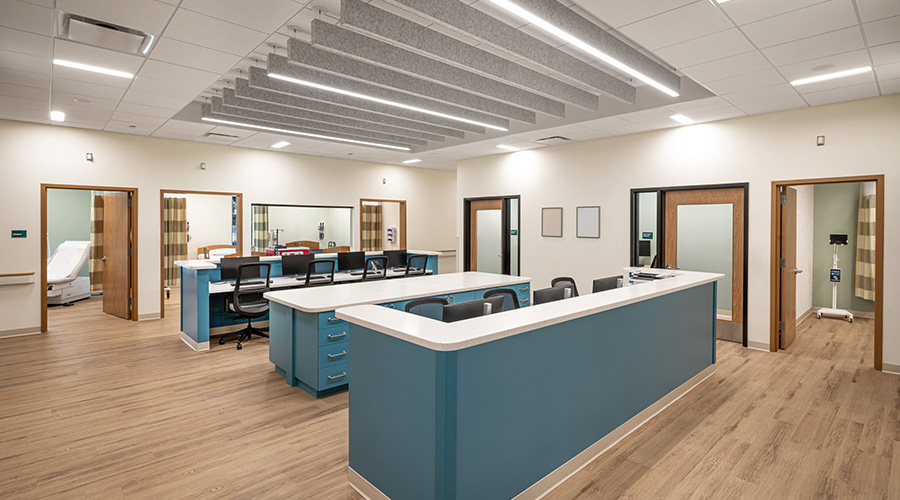Every three days elevators around the globe carry the equivalent of the earth’s population. With so much riding on elevators, it’s essential that hospitals do all they can to ensure elevators remain vertically healthy, and passengers safe.
The elevator industry is undergoing substantial change, driven by the addition of internet connectivity and new green technology. As a result, many people mistakenly believe that maintaining high-quality elevator service requires a significant financial investment. In fact, with the right contract negotiation strategies—and thorough knowledge of the elevator industry—hospitals can maintain high-quality elevator service AND save money.
An evolving industry
Elevator use — and risk — extends to everyone who enters a hospital, including staff, visitors, employees, and patients. Failure to properly maintain elevators exposes hospitals to financial and reputational risks. Entrapment, falls, injuries, and even death have been noted in news reports. And now, with internet-connected elevators, hospitals are exposed to additional risks.
Internet-connected elevators are proving to be a game changer. The ability to display menus, short videos, insurance sign-ups, etc., within elevators extends a hospital’s communication opportunities. Internet-connected technology is also changing how elevators are serviced. From proactive alerts to faults, gathering and analyzing data usage to predict maintenance needs, and even the ability to perform some aspects of service remotely… the possibilities are endless and exciting. However, these advancements come at a price. Hackers constantly look for new ways to break into networks, and internet-connected elevators create yet another entry point. If not properly protected, elevators can quickly become a cybersecurity liability. Once inside the network, hackers can stop elevators, access EHRs, and perform other nefarious acts.
Green elevators are also transforming the elevator industry as hospitals look for new ways to reduce their environmental footprint. Green elevators go beyond just energy consumption. Green elements also include the materials that are used, such as lighting, HVAC systems, and even paint. In new buildings green elevators are quickly becoming the norm. Additionally, advances in technology allow for new gearless traction systems, called Machine Room Less (MRL), which uses 80% less energy than a hydraulic lift. This can help the environment and your budget!
These advances are forcing vendors to reinvest in their employees. Service technicians must expand their knowledge beyond traditional elevators to become network engineers as well. This added training comes at a cost that is typically absorbed within elevator services contracts. The need to better understand a vendor’s capabilities creates a new urgency for hospitals to up their negotiation game to avoid rising elevator service costs during contract negotiations. Successful negotiations can even save you money without sacrificing high-quality service.
You need not be a master negotiator to succeed in your elevator service contract negotiations. You do, however, need to arm yourself with as much knowledge as possible to create leverage during your discussions. To get started, consider the following:
Learn the industry. While you don’t need to be an elevator expert, you should be able to talk intelligently to key stakeholders about the industry. Ask your Purchased Services sourcing partner for an overview so you can learn industry lingo, details on how elevators run, and what industry changes are taking place. Don’t be afraid to ask questions.
Engage key stakeholders. Because elevators are the responsibility of the maintenance/facilities management team, this group is your primary stakeholder. Challenge the perception among maintenance teams that supply chain people only want to save money by nurturing trust. Start by enlisting their help early in the process and be sure to communicate that you care just as much about the quality of service as you do about money. Take advantage of their knowledge of elevator history (e.g., uptime, instances where riders were trapped, etc.). Inquire about their relationship with the current vendor(s).
If you are using, or plan to use, internet-connected elevators, engage your IT department. Ask the vendor what internet-connected services/capabilities they plan to add to elevators. If this information is not part of contract discussions, it could drastically change the contract terms in the future.
Create competition among suppliers. It isn’t uncommon for hospitals, especially larger ones, to have multiple suppliers. Ideally, there would be two, or three at the most. If working with one supplier, consider service contracts at a few clinics using a second supplier for a year to “test them out.” In addition to creating a little competition, this will allow you to see what you are or are not getting from your existing supplier. A little competition allows you to know what’s out there and keeps vendors honest.
Demand price transparency. Vendors are hesitant to share pricing data. They’ll often claim this information is proprietary. Push for the information you want. Demand transparency in the vendor’s basic pricing structure. And be sure that contracts include the following elements: number of elevators; number of stops for each elevator; how many of the elevators are hydraulic, geared, or MRL; level of service for each elevator (i.e., silver, gold, platinum); and age of elevators.
Know your level of service needs. Levels of service are typically three-tiered: silver, gold, and platinum. Rather than a blanket service level for all elevators, base the levels according to each individual elevator and how important it is to daily operations. For example, you don’t need platinum-level 24x7 service on an elevator in a clinic that is open only part-time. Know when things are up and running, and pay only for what you need.
Additional steps should be taken to avoid unwanted and unnecessary spending in the future. These steps include but are not limited to the following:
Understand your warranties. Warranties include very specific details about maintenance. One misstep and you can unknowingly violate an agreement, thus rendering it null and void. The offending action can be as basic as changing a lightbulb. Be sure all terms are in writing and are easily available for review to those who need them.
Inquire about overtime rates. Service overtime rates can vary significantly and may include standard overtime, time-and-a-half, double overtime, and even triple overtime (yes, that exists). Know your service rates for each day and hour, and plan accordingly whenever possible.
Pay attention to your termination clause. Know specific details of the termination clause and associated penalties. If your contract has an automatic renewal, set reminder alerts well in advance of the date. Look for opportunities to be creative with your out clauses and don’t overlook the fine print.
Typically, an out clause must be exercised between 60 and 90 days. If you miss this timeframe, the contract could extend another five years (or whatever is specified in the contract renewal term). Know what is going on and prepare. If you are at the end of a window, ask for an extension (one year is reasonable) so you aren’t rushed.
Require insurance. If an accident occurs and someone gets hurt or dies, the onus should fall on the people taking care of your elevators. Work closely with your legal team to ensure that accountability goes back to the vendor/service provider and not the hospital if something does happen.
Include Information Security. Hospitals with internet-connected elevators need a clause requiring that the elevator service provider remain current on all relevant information-security protocol. Be prepared for pushback from the elevator service vendor, who may claim that because they don’t have access to personal health information (PHI) this does not apply to them. If this language in is not in your contract and a hacker accesses your network, the hacker could gain access to PHI and other systems and the vendor would not be held accountable. This language protects your organization and can help you recoup damage that may be done to your reputation or put your patients at risk.
When it comes to contract negotiations, the old adage that knowledge is power couldn’t ring truer. With knowledge comes leverage. Having data in hand and a clear idea of the desired goal puts you in a powerful position at the negotiation table.
Aimee Jackson is the Purchased Services Senior Analyst and Bill Walker is the Professional Services Practice Director for TractManager.

 Hand, Foot and Mouth Disease on the Rise
Hand, Foot and Mouth Disease on the Rise BayCare Reveals Pagidipati Children's Hospital at St. Joseph's
BayCare Reveals Pagidipati Children's Hospital at St. Joseph's Preparing for the Hazards of Winter Weather
Preparing for the Hazards of Winter Weather Why Identity Governance Is Becoming a Facilities Management Issue
Why Identity Governance Is Becoming a Facilities Management Issue Habitat Health Opens South Los Angeles PACE Center
Habitat Health Opens South Los Angeles PACE Center